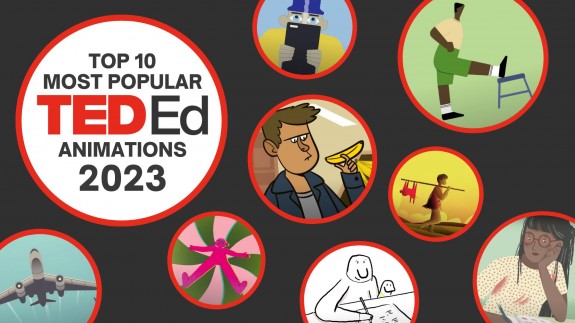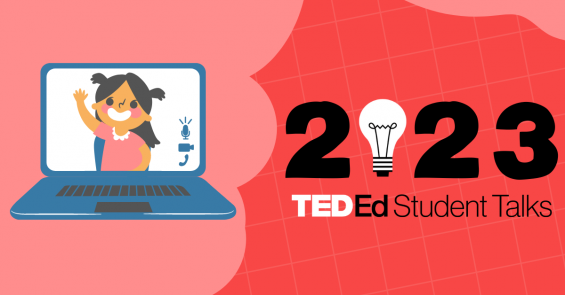
The 10 most popular TED-Ed Animations of 2023
In 2023, our YouTube audience spent nearly 18 million hours watching TED-Ed Animations (that’s equal to over 2,000 years!). Our most-viewed videos of 2023 include an exploration of what it would be like to be reincarnated as every human who ever lived, a debunking of the most common misconceptions about the Middle Ages, tips on how to become an effective studier, one to help you understand if talking to yourself is normal (don’t worry, it is), and more.
Behold our top 10 most popular videos of 2023:
1. Food expiration dates don’t mean what you think
Countries around the world waste huge amounts of food every year: roughly a fifth of food items in the US are tossed because consumers aren’t sure how to interpret expiration labels. But most groceries are still perfectly safe to eat past their expiration dates. If the dates on our food don’t tell us that something’s gone bad, what do they tell us? Carolyn Beans shares how to prevent food waste.
2. Why do we have crooked teeth when our ancestors didn’t?
According to the fossil record, ancient humans usually had straight teeth, complete with wisdom teeth. In fact, the dental dilemmas that fuel the demand for braces and wisdom teeth extractions today appear to be recent developments. So, what happened? While it’s nearly impossible to know for sure, scientists have a hypothesis. G. Richard Scott shares the prevailing theory on crooked teeth.
3. How stretching actually changes your muscles
An athlete is preparing for a game. They’ve put on their gear and done their warmup, and now it’s time for one more routine — stretching. Typically, athletes stretch before physical activity to avoid injuries like strains and tears. But does stretching actually prevent these issues? And if so, how long do the benefits of stretching last? Malachy McHugh explores the finer points of flexibility.
4. What happens if you don’t put your phone in airplane mode?
Right now, invisible signals are flying through the air all around you. Massive radio waves carry information between computers, GPS systems, cell phones, and more. And the sky is flooded with interference from routers, satellites, and, of course, people flying who haven’t put their phones on airplane mode. So, what exactly does airplane mode do? Lindsay DeMarchi explains the setting’s importance.
5. 3 tips on how to study effectively
A 2006 study took a class of surgical residents and split them into two groups. Each received the same study materials, but one group was told to use specific study methods. When tested a month later, this group performed significantly better than the other residents. So, what were these methods? Explore how the brain learns and stores information and how to apply this to your study habits.
6. What if you experienced every human life in history?
Imagine that your life began as one of the planet’s first humans. After dying, you’re reincarnated as the second human ever to live. You then return as the third person, the fourth, the fifth, and so on – living the lives of every human that’s ever walked the Earth. How will your actions in one life impact your future selves? Explore the ethics of the philosophy known as longtermism.
7. Is it normal to talk to yourself?
Being caught talking to yourself can feel embarrassing, and some people even stigmatize this behavior as a sign of mental instability. But decades of research show that talking to yourself is completely normal; most if not all of us engage in some form of self-talk every day. So why do we talk to ourselves? And does what we say matter? Dig into the psychological benefits of positive self-talk.
8. How to make smart decisions more easily
Everything our bodies do— whether physical or mental— uses energy. Studies have found that many individuals seem to have a daily threshold for making decisions, and an extended period of decision-making can lead to cognitive exhaustion. So, what kinds of choices lead us to this state, and what can we do to fight fatigue? Explore the psychology of decision fatigue and ways you can avoid fatigue.
9. 6 myths about the Middle Ages that everyone believes
Medieval Europe. Where unbathed, sword-wielding knights ate rotten meat, thought the Earth was flat, defended chastity-belt wearing maidens, and tortured their foes with grisly gadgets. Except… this is more fiction than fact. So, where do all the myths about the Middle Ages come from? And what were they actually like? Stephanie Honchell Smith debunks common misconceptions about the time period.
10. How do airplanes stay in the air?
By 1917, Albert Einstein had explained the relationship between space and time. But, that year, he designed a flawed airplane wing. His attempt was based on an incomplete theory of how flight works. Indeed, insufficient and inaccurate explanations still circulate today. So, where did Einstein go wrong? And how exactly do planes fly? Raymond Adkins explains the concept of aerodynamic lift.
On behalf of everyone here at TED-Ed, thanks for learning with us this year!
To get brand new TED-Ed Animations delivered to your inbox for free in 2024, sign up for the TED-Ed weekly newsletter here >>
Check out our most popular Animations for 2022, 2021, 2020, 2019, and 2018.




